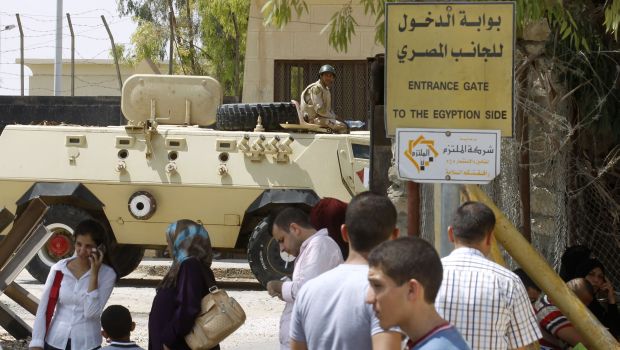
An Egyptian soldier sits on an armored vehicle as Palestinians wait to be given the permission to cross into Egypt at the Rafah border crossing in the southern Gaza Strip, on August 28, 2014. (AFP/Said Khatib)
Gaza, Asharq Al-Awsat—Movement across Gaza’s main border crossings with Egypt and Israel remain slow despite indications of possible changes being enforced following the Egyptian-brokered ceasefire deal that ended almost fifty days of war in the enclave, officials told Asharq Al-Awsat.
Palestinian officials in Gaza and the West Bank overseeing border crossing activity denied that there have been any tangible changes to movement across the borders, rejecting recent media reports claiming otherwise.
In comments to Asharq Al-Awsat, director of the Department of Crossings Nazmi Muhana said Israel has not coordinated with the Palestinian side over the new mechanisms included in the ceasefire deal.
The official said his department is yet to receive any new information about Israel opening Karni crossing which had been completely shut down or allowing movement of individuals across Erez crossing.
There are three crossings between Gaza and Israel: Erez in the north, Karni in the east and Kerem Shalom in the far south of the enclave.
As for Kerem Shalom, the enclave’s only commercial route to Israel, Muhana affirmed that the crossing is open, adding that most of the Gaza Strip’s raw needs are allowed into the enclave except building material.
Israel blocked the entry of building material into Gaza eight years ago, claiming that the Hamas Islamist movement could use this to dig tunnels.
Director of Gaza’s Department of Crossings Maher Abu Sabha told Asharq Al-Awsat that the Rafah crossing with Egypt has not seen any improvement, citing a lack of communication between the Egyptian and Palestinian sides.
According to the official, approximately 300 humanitarian cases need to be transferred across the border from Gaza into Egypt on a daily basis, but not all cases are approved based on security grounds.
No humanitarian aid convoys have entered Gaza from Egypt, Abu Sabha said.
Speaking to Asharq Al-Awsat on the condition of anonymity, sources close to the Palestinian delegation that participated in the Cairo negotiations said that positive changes in border crossing procedures should be implemented soon.
The official added that an agreement had also been reached for Israel to allow the entry of construction and other raw material into the enclave.
The ceasefire deal provides new mechanisms for the administration of all border crossings which are yet to announced publicly.

Trackbacks/Pingbacks